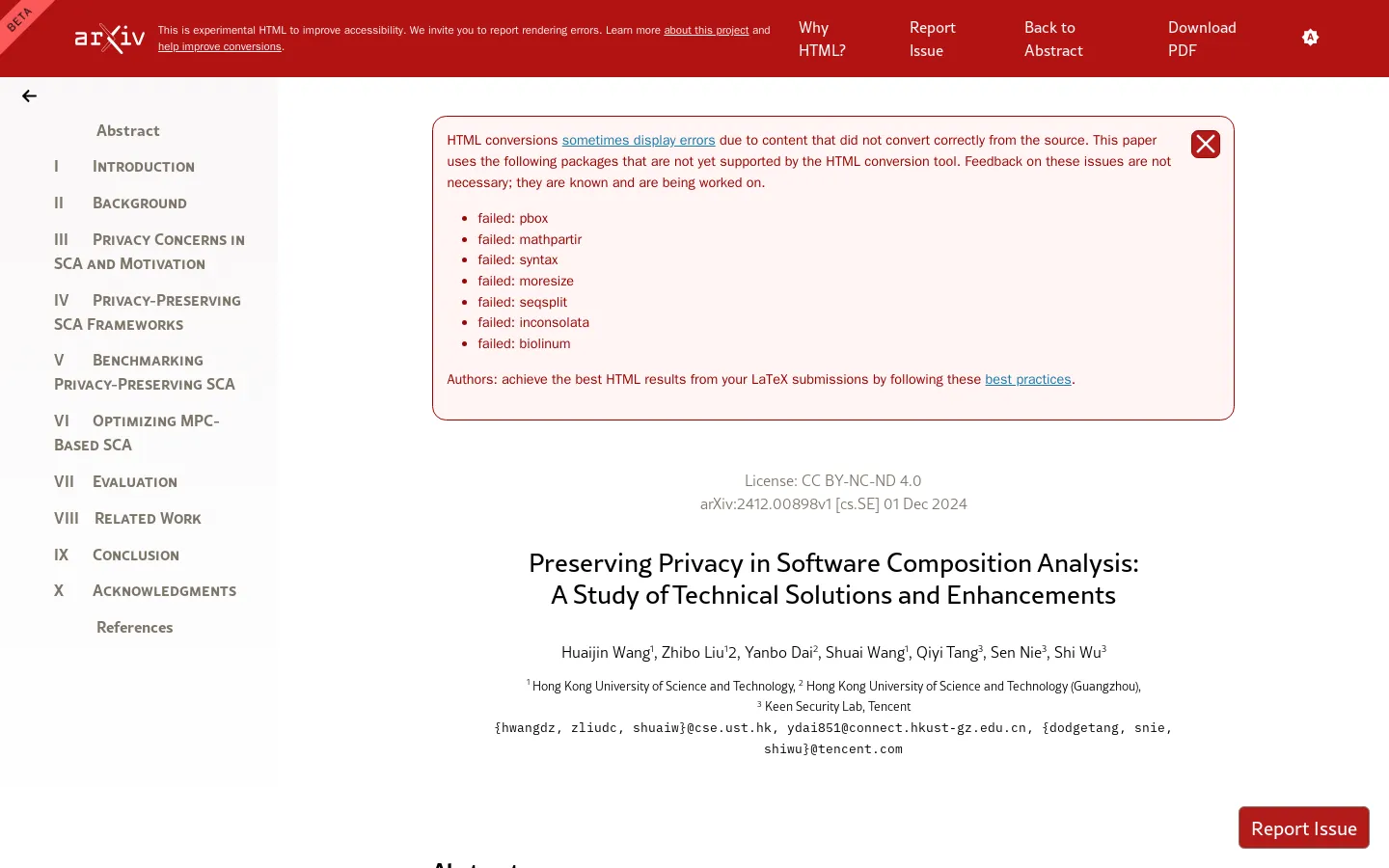
Advancements in Privacy-Preserving Software Composition Analysis
/ 4 min read
Quick take - Researchers are advancing privacy-preserving techniques in software composition analysis (SCA) to address privacy concerns associated with traditional methods that require uploading sensitive source code to remote servers, focusing on innovative frameworks, optimization strategies, and empirical evaluations to enhance data security without compromising analysis accuracy.
Fast Facts
-
Privacy Concerns in SCA: Traditional Software Composition Analysis (SCA) methods require uploading sensitive source code to remote servers, raising significant privacy and security risks.
-
Research Objectives: The initiative focuses on identifying privacy requirements, exploring privacy-preserving solutions like multi-party computation (MPC) and similarity-based bucketization (SBB), and optimizing performance to minimize overhead.
-
Empirical Evaluation: A comprehensive evaluation of proposed frameworks will benchmark their performance on accuracy, processing overhead, and privacy leakage risks to ensure effectiveness and trustworthiness.
-
Best Practices for Organizations: Emphasizing data minimization, robust anonymization techniques, strict access controls, and continuous monitoring can enhance privacy and security in SCA processes.
-
Tools for Enhanced Privacy: Recommended tools include Multi-Party Computation (MPC), Similarity-Based Bucketization (SBB), and frameworks like CrypTen and DPCNN to facilitate secure and efficient software analysis while protecting sensitive data.
Advancements in Privacy-Preserving Software Composition Analysis
In a pivotal development for software security, researchers are making strides in privacy-preserving software composition analysis (SCA). Traditional SCA methods often require sensitive source code to be uploaded to remote servers, sparking significant privacy and data security concerns. This new initiative aims to address these issues by exploring innovative frameworks that enhance privacy without compromising the accuracy of analysis.
Addressing Privacy Concerns
The primary objective of this initiative is to tackle the inherent privacy challenges associated with conventional SCA techniques. These methods typically involve sharing sensitive source code, which poses a substantial risk of data exposure. Researchers are focused on identifying and analyzing these privacy requirements to develop solutions that mitigate such risks effectively.
Exploring Privacy-Preserving Solutions
To enhance privacy in SCA, researchers are investigating advanced techniques like multi-party computation (MPC) and similarity-based bucketization (SBB). MPC allows multiple parties to compute functions over their inputs while keeping those inputs private, ensuring confidentiality during collaborative processes. SBB organizes data into buckets based on similarity metrics, facilitating secure and efficient analysis without exposing sensitive information.
Optimizing Performance
A critical aspect of this research is optimizing the performance of MPC-based SCA frameworks. Traditionally, these frameworks have been associated with significant computational overhead. By developing optimization strategies, researchers aim to make these privacy-preserving methodologies practical for real-world applications, offering robust privacy guarantees without hindering performance.
Empirical Evaluation
The initiative also includes a comprehensive empirical evaluation of the proposed frameworks. This involves benchmarking their performance based on key metrics such as accuracy, processing overhead, and privacy leakage risks. Such evaluations ensure that the solutions are not only effective but also trustworthy for widespread adoption in the tech sector.
Implications of the Research
As organizations increasingly rely on SCA for compliance and security in software development, the need for privacy-preserving mechanisms becomes critical. This research could set new standards for privacy in SCA, influencing industry practices and regulatory frameworks. The focus on empirical evaluation ensures that these solutions are viable options for real-world application.
Essential Steps for Privacy-Preserving SCA
-
Data Minimization: Collect only essential data required for analysis to reduce the risk of exposing sensitive information.
-
Anonymization Techniques: Implement robust anonymization methods like data masking and hashing to protect identifiable information.
-
Access Control Mechanisms: Establish strict access controls by defining user roles and permissions to prevent unauthorized data exposure.
-
Continuous Monitoring and Auditing: Regularly monitor and audit SCA processes to detect anomalies or breaches promptly.
Best Practices for Organizations
Organizations should integrate privacy considerations into their SCA processes from the outset. Conduct thorough assessments of both open source and proprietary components to identify potential privacy risks. Implement automated tools for continuous monitoring to ensure compliance with privacy regulations and gain real-time insights into vulnerabilities.
Fostering a culture of awareness around privacy issues among development teams is crucial. Regular training sessions can equip staff with the knowledge needed to address privacy-related challenges effectively. Establish clear policies for handling sensitive data within software components to protect user information and reinforce organizational commitment to privacy.
By following these strategies, organizations can enhance their SCA processes while addressing privacy concerns, leading to more secure software development practices.
Tools and Resources for Enhanced Privacy
-
Multi-Party Computation (MPC): Enables joint computation over private inputs without exposing them.
-
Similarity-Based Bucketization (SBB): Organizes data into buckets based on similarity metrics for secure analysis.
-
CrypTen: A framework for secure computation that facilitates building privacy-preserving machine learning models.
-
DPCNN (Deep Parallel Convolutional Neural Network): Analyzes software components while maintaining data privacy.
Leveraging these tools can significantly enhance Software Composition Analysis efforts while ensuring sensitive data remains protected throughout the process.



